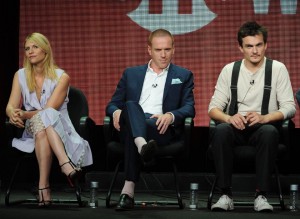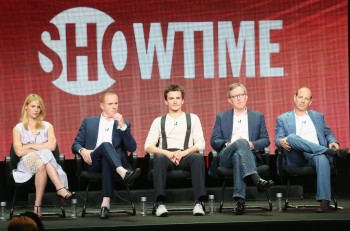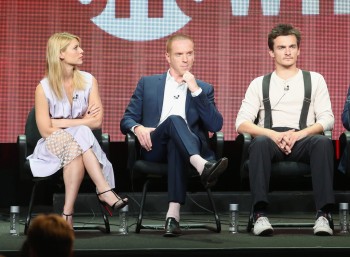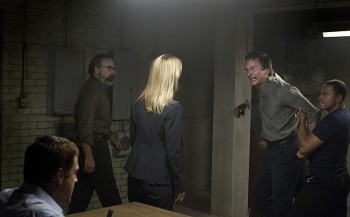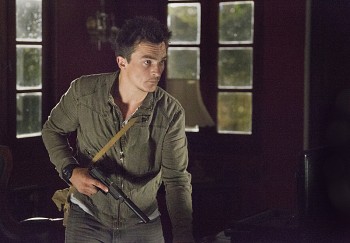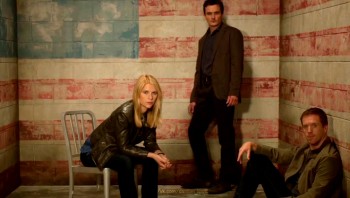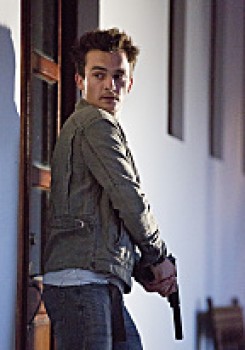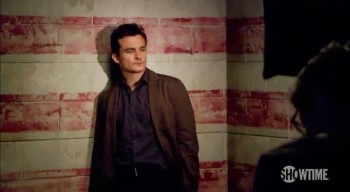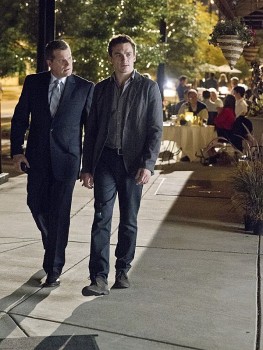Post by DizzyMissLizzie on Jul 31, 2013 3:20:14 GMT -5
Claire Danes, Damian Lewis and the 'Homeland' Producers on Betrayal, Sanity and the Real News Events That Influenced the New Season
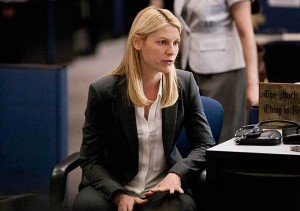
Last year, "Homeland" snagged a slew of Emmys even as its second season generated a backlash based on what some saw as a departure from the first season's grounding in reality for something less plausible if more dramatic. How the suspense series would approach its upcoming third season, which premieres on Showtime on September 29th, was on everyone's mind when stars Claire Danes, Rupert Friend and Damian Lewis arrived at the TCA summer press tour yesterday along with producers Alex Gansa (the showrunner) and Howard Gordon. Mild spoilers for the past season and early episodes of the upcoming one follow.
Asked about Carrie Mathison's state of mind (and medication) at the start of season three, Danes suggested the character always faced "an impossible dilemma because she is not great on the meds and she's even worse off of them -- but there's a sweet spot in the middle of those two states that she's always trying to land on where she's exceptionally high performing. But it's pretty bleak in the beginning. She's gone off her meds for all sorts of reasons she believes strongly in, but it's always a little precarious."
The new season also refocuses on Carrie's relationship with Saul (Mandy Patinkin), Danes said. "She does feel a certain level of betrayal, but they share both share an enormous, profound amount of guilt and responsibility for this devastating bomb, this loss. Even though they are estranged from each other, they are they are very deeply connected because they experienced that trauma in a way that no one else has."

Lewis' Nicholas Brody doesn't actually appear in the first two episodes shown to press, which Gansa was asked to address. "The decision was strictly a function of where the story was taking us," he explained. "So much was transpiring on the ground in Washington that Brody's flight from America just made it impossible to include that storyline in the first couple of episodes."
"Brody is on the lam," Lewis added "He's disappeared into an exfiltration procedure which Carrie has effected, and he's the most wanted criminal in the world, arguably, at this point. So he has to lay low. When you do see Brody, I think, hopefully, what will be of interest to the audience is what state will he be in? Is he swanning around a yacht off the Côte d’Azure, surrounded by a bevy of Russian beauties -- that was the pitch I plugged in -- is he hidden away securely somewhere, or is he lost?"
One of the season three's themes, Gansa said, will be "the cost being an intelligence officer exacts on the people who are in that career. Saul and Carrie are obviously the prime examples of that this season. As a result of the attack last year, the CIA itself is on trial. That is an agency that couldn't even protect itself -- how should it be expected to protect the country? Saul is confronted with that very question in the first episode, and finds himself in a unique and different position than he's ever been in before."
Saul is "sitting in the director's chair," Gansa continued. "He's been quite comfortable on the sidelines for the last 20 years criticizing, making suggestions. All of a sudden, he finds himself now having to make the decisions, and with the actual existence of the CIA in question, he has to make some very uncharacteristic choices that he's not comfortable making, and, obviously, one of them has direct bearing on his protege, Carrie." He suggested the early developments with Saul were inspired in part by Darrell Issa and Benghazi.

Asked about the introduction of Nazanin Boniadi as Fara, a Persian analyst, Gansa pointed out that "in any show about terrorism these days, you obviously want to portray a Muslim character that isn't somebody who is thinking about attacking the country. But more importantly than that, in the wake of the attack that happened at the end of that last season, the CIA itself is decimated and is looking for Arab speakers, looking for Farsi speakers here to try to track where the attack came from, and this is the logical choice."
And speaking to the decision to continue to include the Brody family despite its patriarch not being around, he said that they'd consulted the new writers brought onto the show this season and "it was a unanimous consensus that there was interest in those people. We felt we had to honor what their lives would be like after this devastating attack and after their father, husband, was accused of being the guy who did it. And there was the Sandy Hook shooting and the Boston Marathon bombing, and all these family members are always paraded in front of the cameras, and it felt like a very good avenue to explore."
Finally, addressing the backlash, Gansa suggested that season three has not been shaped by the feedback: "Our job is to put the shows out in the best way we think possible, and it's your guys' job to like them or not like them. I obviously wish the backlash had never happened, but it didn't really influence either the way we rolled out season two or season three. The show built an audience all through season two, and our 11 Emmy nominations are a nice comeback." The show also managed to be parodied on "Saturday Night Live," which Danes noted was a good sign it's "relevant": "We're in the zeitgeist. We're cool enough to make fun of."
www.indiewire.com/article/television/tca-homeland

Last year, "Homeland" snagged a slew of Emmys even as its second season generated a backlash based on what some saw as a departure from the first season's grounding in reality for something less plausible if more dramatic. How the suspense series would approach its upcoming third season, which premieres on Showtime on September 29th, was on everyone's mind when stars Claire Danes, Rupert Friend and Damian Lewis arrived at the TCA summer press tour yesterday along with producers Alex Gansa (the showrunner) and Howard Gordon. Mild spoilers for the past season and early episodes of the upcoming one follow.
Asked about Carrie Mathison's state of mind (and medication) at the start of season three, Danes suggested the character always faced "an impossible dilemma because she is not great on the meds and she's even worse off of them -- but there's a sweet spot in the middle of those two states that she's always trying to land on where she's exceptionally high performing. But it's pretty bleak in the beginning. She's gone off her meds for all sorts of reasons she believes strongly in, but it's always a little precarious."
The new season also refocuses on Carrie's relationship with Saul (Mandy Patinkin), Danes said. "She does feel a certain level of betrayal, but they share both share an enormous, profound amount of guilt and responsibility for this devastating bomb, this loss. Even though they are estranged from each other, they are they are very deeply connected because they experienced that trauma in a way that no one else has."

Lewis' Nicholas Brody doesn't actually appear in the first two episodes shown to press, which Gansa was asked to address. "The decision was strictly a function of where the story was taking us," he explained. "So much was transpiring on the ground in Washington that Brody's flight from America just made it impossible to include that storyline in the first couple of episodes."
"Brody is on the lam," Lewis added "He's disappeared into an exfiltration procedure which Carrie has effected, and he's the most wanted criminal in the world, arguably, at this point. So he has to lay low. When you do see Brody, I think, hopefully, what will be of interest to the audience is what state will he be in? Is he swanning around a yacht off the Côte d’Azure, surrounded by a bevy of Russian beauties -- that was the pitch I plugged in -- is he hidden away securely somewhere, or is he lost?"
One of the season three's themes, Gansa said, will be "the cost being an intelligence officer exacts on the people who are in that career. Saul and Carrie are obviously the prime examples of that this season. As a result of the attack last year, the CIA itself is on trial. That is an agency that couldn't even protect itself -- how should it be expected to protect the country? Saul is confronted with that very question in the first episode, and finds himself in a unique and different position than he's ever been in before."
Saul is "sitting in the director's chair," Gansa continued. "He's been quite comfortable on the sidelines for the last 20 years criticizing, making suggestions. All of a sudden, he finds himself now having to make the decisions, and with the actual existence of the CIA in question, he has to make some very uncharacteristic choices that he's not comfortable making, and, obviously, one of them has direct bearing on his protege, Carrie." He suggested the early developments with Saul were inspired in part by Darrell Issa and Benghazi.

Asked about the introduction of Nazanin Boniadi as Fara, a Persian analyst, Gansa pointed out that "in any show about terrorism these days, you obviously want to portray a Muslim character that isn't somebody who is thinking about attacking the country. But more importantly than that, in the wake of the attack that happened at the end of that last season, the CIA itself is decimated and is looking for Arab speakers, looking for Farsi speakers here to try to track where the attack came from, and this is the logical choice."
And speaking to the decision to continue to include the Brody family despite its patriarch not being around, he said that they'd consulted the new writers brought onto the show this season and "it was a unanimous consensus that there was interest in those people. We felt we had to honor what their lives would be like after this devastating attack and after their father, husband, was accused of being the guy who did it. And there was the Sandy Hook shooting and the Boston Marathon bombing, and all these family members are always paraded in front of the cameras, and it felt like a very good avenue to explore."
Finally, addressing the backlash, Gansa suggested that season three has not been shaped by the feedback: "Our job is to put the shows out in the best way we think possible, and it's your guys' job to like them or not like them. I obviously wish the backlash had never happened, but it didn't really influence either the way we rolled out season two or season three. The show built an audience all through season two, and our 11 Emmy nominations are a nice comeback." The show also managed to be parodied on "Saturday Night Live," which Danes noted was a good sign it's "relevant": "We're in the zeitgeist. We're cool enough to make fun of."
www.indiewire.com/article/television/tca-homeland



